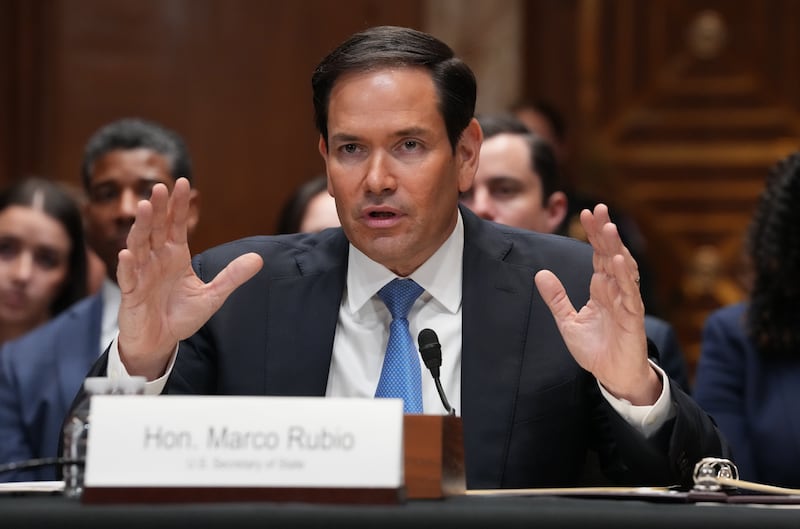It’s only four months into Donald Trump‘s second term as president, and his administration already seems fed up with all the paperwork.
The administration has responded to a court order requiring that it provide potential deportees with the “meaningful opportunity” to challenge their deportations in court on two fronts: with a legal challenge and declaration from State Secretary Marco Rubio, and rhetorical attacks on social media.
Late Saturday night, the Department of Justice posted in its entirety their legal challenge to an order from M.A. District Judge Brian Murphy blocking the Trump administration from deporting immigrants to third countries.
In the motion, the DOJ argues that the requirement that the Department of Homeland Security provide detainees with the opportunity to challenge their deportations is “burdensome” because the DHS is required to “maintain custody and control” of the detainees and conduct interviews regarding any reasonable fears they may have about being deported to third countries in private at a time of the detainees’ choosing.
One such detainee was a gay Guatemalan man, known only as O.C.G., who was deported to Mexico in March in what the Trump administration has since admitted was an error. As a result, on Friday Judge Murphy ruled that the Trump administration must facilitate the man’s return to the U.S.
Sec. Marco Rubio also responded to the injunction in a declaration filed with the court and posted to X by DOJ Chief of Staff Chad Mizelle on Saturday. In his declaration, Rubio argues that orders made by the court cause “significant and irreparable harm” to U.S. foreign policy and its strategic interests in Libya, South Sudan, and Djibouti.
According to Rubio, court orders that prevent the Trump administration from deporting people to countries they have no ties to would cause damages such as harming humanitarian efforts in South Sudan; an argument which, as Rolling Stone points out, sounds particularly odd coming from the administration that single-handedly decimated USAID. The Trump administration has already deported at least two Asian immigrants to South Sudan in violation of court orders.

While the case is still in front of Judge Murphy, Mizelle’s post made it clear that the Trump administration wants to escalate the legal battle to a potentially more sympathetic Supreme Court, tweeting, “SCOTUS needs to immediately intervene and reign in judges masquerading as diplomats.”
Rubio’s newfound commitment to enforcing Trump’s hardline anti-immigration policies represents a shift from earlier in his career, when he had previously called for compassion toward undocumented immigrants, going so far as to refer to helping those covered by the DREAM Act as a “humanitarian mission.”
Top Trump adviser Stephen Miller also weighed in, reposting a tweet from DHS that referred to Murphy as an “activist judge” and adding, “The only process illegals are due is deportation.” Under the U.S. Constitution, everybody under its jurisdictions, both citizens and non-citizens alike, is afforded the right of due process.
Miller’s influence on Trump was evident when, last month, he took to TruthSocial to mount a similar argument, claiming that there simply was not sufficient time or court capacity to afford every potential deportee due process.
The president wrote, “It is not possible to have trials for millions and millions of people. We know who the Criminals are, and we must get them out of the U.S.A.—and FAST!”
Despite facing numerous legal setbacks in his attempt to carry out his planned mass deportations, it is clear that Trump is hoping that dragging the issue into the court of public opinion will yield better results.
This agenda was laid bare in the DOJ’s late night post, which read, “Federal courts cannot direct the conduct of foreign relations, and the court’s orders in this case disrupt the president’s ability to faithfully execute our immigration laws,”—a clear misrepresentation of the role the legal system plays in interpreting the law, but one that will doubtless not matter to much of Trump’s base.

